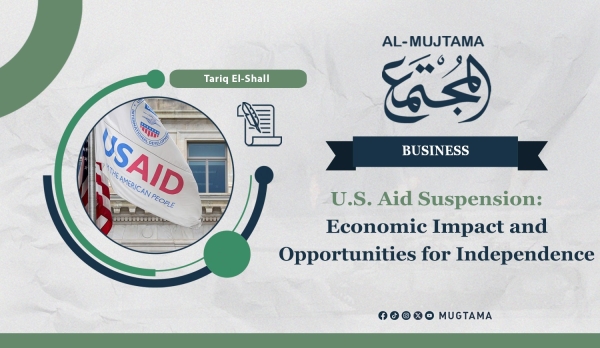U.S. Aid Suspension: Economic Impact and Opportunities for Independence
Foreign aid plays a dual role for both donor and recipient countries. For donor countries, it is one of the most important tools for achieving their desired interests behind providing such assistance. As for recipient countries, foreign aid serves as an attempt to overcome crises, whether temporary in the case of disasters and calamities or medium- to long-term, as it is used to address structural issues on economic, social, and even political levels.
Several advanced, emerging, and even developing countries have shown interest in the issue of foreign aid. This includes the aid provided by oil-rich Arab states. However, U.S. aid remains the most prominent worldwide in terms of role and influence.
Aid as a Tool of U.S. Foreign Policy, Not a Humanitarian Act
According to some recently published data, the U.S. foreign aid budget in 2022 amounted to approximately $70 billion, representing less than 1% of the U.S. federal budget, which is estimated at around $6 trillion. In general, U.S. aid constitutes about 29% of the total official development assistance provided by 32 donor countries within the Development Assistance Committee of the Organization for Economic Cooperation and Development (OECD).
Trump and the Suspension of Aid
Following his election victory and assumption of office on January 20, 2025, Trump introduced several controversial agendas both domestically and internationally, including the suspension of a significant portion of U.S. foreign aid. However, in the Middle East, military aid to Egypt and the Zionist entity was exempted.
This decision was driven by the declared objective of reducing the U.S. federal budget deficit, with an intended budget cut of approximately $2 trillion—equivalent to around 30%. However, the move sparked significant debate both within the U.S. and abroad.
On multiple occasions, businessman Elon Musk, who was tasked with rationalizing government spending, stated that U.S. foreign aid had been marred by corruption and that certain officials within the aid agency were working against American interests.
Civil Society Programs and Institutions at Risk
Domestically, employees benefiting from positions in the aid agency face potential unemployment if the agency's budget is reduced or eliminated. Additionally, organizations and programs relying entirely on U.S. aid—whether civilian or military—will be disrupted. However, it is crucial to understand that U.S. aid, since its inception in the early 1960s, has always been a tool for advancing U.S. foreign policy objectives rather than an act of humanitarian goodwill.
Notably, this is not the first time the U.S. has threatened to reduce or cancel foreign aid. Previous instances were usually limited to specific countries when political disagreements arose, as seen in Egypt on multiple occasions. Yet, in each case, the aid was eventually restored—sometimes retroactively. This highlights how U.S. foreign aid functions as both a carrot and a stick.
Thus, it is unlikely that the Trump administration’s decision to suspend foreign aid will be permanent. Even if it lasts throughout Trump’s entire term, a successor—especially a Democratic president—would likely reinstate the aid agency, not out of generosity or concern for recipient nations, but to maintain the strategic benefits the U.S. gains from its foreign aid programs.
Implications and Opportunities
Although the U.S. aid suspension decision has been enacted—with the exception of military aid to Egypt and the Zionist entity—this does not mean that the rest of the aid is purely civilian in nature. Many beneficiaries of U.S. military aid remain, most notably Ukraine, which has been the largest recipient of U.S. aid since the Russian invasion in late February 2022.
U.S. Companies Will Suffer Due to Aid Agreements Requiring American-Origin Goods
One factor that encouraged Trump to suspend foreign aid was his agenda to end the Russia-Ukraine war by pursuing peace between the two nations.
The implications of suspending U.S. aid will significantly impact American companies benefiting from aid programs. The majority of U.S. aid agreements require that the goods or services provided originate from the United States. As a result, a substantial portion of aid funds was essentially being redirected back into the American economy. Even military and defense aid primarily benefits American arms manufacturers, as well as companies involved in providing spare parts and regular maintenance for U.S. weaponry.
Additionally, if foreign aid programs are halted, the continuous flow of vast amounts of data and intelligence transmitted to the U.S. through various aid-related programs will also cease. This could lead to strong opposition from U.S. intelligence agencies against Trump’s decision, which he has set to last for three months. In today’s world, information is one of the most valuable assets that countries seek to acquire and control.
For recipient countries, numerous programs—especially those tied to civil society institutions—may come to a complete halt as they have been entirely dependent on U.S. aid for funding.
Trump’s Decision Creates an Opportunity for Aid-Dependent Nations to Achieve Political and Economic Independence
However, this situation also presents significant opportunities for aid-receiving nations, particularly for governments with a clear vision and serious commitment to development. By reducing dependence on U.S. aid, these nations can work toward securing alternative funding sources for programs previously financed by foreign assistance. These alternatives could include government resources, private sector investments, or community-driven initiatives.
Trump’s decision to suspend foreign aid provides an opportunity for recipient countries to assert greater independence in both political and economic decision-making. It allows them to oppose or resist U.S. influence on matters of national, regional, or international concern. Economic self-sufficiency is just as crucial as political independence, and this shift can empower nations to make sovereign choices without external pressure.
Another advantage of suspending U.S. aid is that it enables recipient countries to combat the corruption that has plagued numerous aid-funded programs. Corruption has been widespread among government officials, civil society leaders, and those managing aid-related initiatives. In many cases, these programs have also been exploited for political blackmail, particularly in issues related to minority rights, sectarian tensions, or the promotion of ideologies that clash with the religious and cultural values of local communities.
-------------------------------------------------------------
